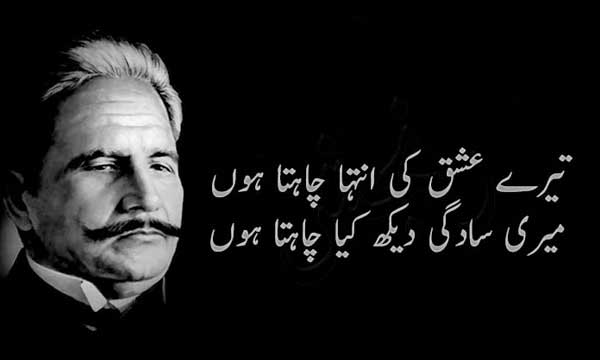Thomas Hood, English Poet and Humorist, who wrote poem Eugene Aram’s Dream described the 11th month of the Gregorian calendar in a phrase: “No shade, no shine, no butterflies, no bees, no fruits, no flowers, no leaves, no birds, – November”. But our very own Dr. Muhammad Iqbal’s birthday that falls on ‘November 09’ is a special time to celebrate the gift of ‘Iqbal Lahori’, as internationally called, to the world. I thought if Mr. Hood had observed in his lifetime the multiple shades, shines, colors, fragrances and the flights of fancies of maverick Iqbal he would have a different thought about November. Unfortunately, Hood died in 1845 far before Iqbal.
In Pakistan as well as in India, Iran and around the world, media and literary organisations celebrate the birthday event of the great thinker, philosopher, poet and writer through special editions, talk shows and seminars in which intellectuals from different sectors highlight on the life and work of Iqbal that is not only diverse but very expansive too. Nevertheless it is almost very difficult if not impossible to do justice with this creative giant of all times.
In this article, let me present Iqbal through different perspective even though I am an elementary level student of this great creative soul. Instead of quoting Iqbal’s Urdu and Persian couplets from his huge volumes to explain his fossil thoughts on variety of subjects, I have selected few stray reflections and thoughts from his own private notebook published by Iqbal Academy Pakistan in 2006 [Third Edition] under the editorship of Iqbal’s own son Dr. Javed Iqbal, who died just a few weeks ago. The first edition of Stray Reflections: The Private Notebook of Muhammad Iqbal [also includes: ‘Stray Thoughts’] brought out in 1961.
According to this notebook Iqbal started writing it on April 27, 1910. It appears that he continued to write it for several months and then stopped for some unknown reason. Iqbal himself gave the title Stray Reflections to this notebook. It contains odd jottings based on his impressions of the books he was reading at that time, his thoughts and feelings about the environment in which he lived, and reminiscences of his student days. Iqbal may have stopped writing the notebook, but most of these jotting as well as additional notes which he went on scribing during the subsequent years (and which are incorporated in this volume) did appear from time to time in different English journals, news-papers, etc. of the subcontinent until 1932. He died in 1938.
Commenting on the notebook, Dr. Javed Iqbal in his ‘Afterword’ writes:
“Although we may disagree with some of his ideas, this notebook enables us to glimpse the liveliness, richness, and fertility of Iqbal’s mind. We see the many-sidedness of his interests and meet his views on a wide variety of subjects such as art, philosophy, literature, science, politics and religion. He also refers to the psychological effects of imperialism on a subjugated people.”
So here it is! I have picked only a few stray reflections and thoughts on various topics from the private notebook of Iqbal for brandsynario visitors with the purpose of revisiting his vast poetry collection under the direction of Iqbal’s own reflections and thoughts. Please go through this article meticulously and provide your feedback by expressing your angle on the subject under discussion:
Human Intellect
Human intellect is nature’s attempt at self-criticism.
Stray Reflections: The Private Notebook of Muhammad Iqbal, 17
Power of Belief
Belief is a great power. When I see that a proposition of mine is believed by another mind, my own conviction of its truth is thereby immensely increased.
Stray Reflections: The Private Notebook of Muhammad Iqbal, 23
The God of Islam
Christianity describes God as love; Islam as power. How shall we decide between the two conceptions? I think the history of mankind and of the universe as a whole must tell us as to which of the two conceptions is truer. I find that God reveals Himself in history more as power than love. I do not deny the love of God; I mean that, on the basis of our historical experience, God is better described as power.
Stray Reflections: The Private Notebook of Muhammad Iqbal, 24
Forms of Government
To my mind, government, whatever its form, is one of the determining forces of a people’s character. Loss of political power is equally ruinous to nations’ character
Stray Reflections: The Private Notebook of Muhammad Iqbal, 27
History
History is a sort of applied ethics. If ethics is to be an experimental science like other sciences, it must be based on the revelations of human experience.
Stray Reflections: The Private Notebook of Muhammad Iqbal, 31
Patriotism
Islam appeared as a protest against idolatry. And what is patriotism but a subtle form of idolatry; a deification of a material object. The patriotic songs of various nations will bear me out in my calling patriotism a deification of a material object. Islam could not tolerate idolatry in any form.
Stray Reflections: The Private Notebook of Muhammad Iqbal, 35
Justice
Justice is an inestimable treasure; but we must guard it against the thief of mercy.
Stray Reflections: The Private Notebook of Muhammad Iqbal, 36
Muslim Solidarity
From what I have said above on Islam and patriotism it follows that our solidarity as a community rests on our hold on the religious principle. The moment this hold is loosened we are nowhere. Probably the fate of the Jews will befall us. And what can we do in order to tighten the hold? Who is the principal depositary of religion in a community? It is the woman. The Musalman woman ought to receive sound religious education, for she is virtually the maker of the community.
Stray Reflections: The Private Notebook of Muhammad Iqbal, 37
The Modern Hindu
The modern Hindu is quite a phenomenon. To me his behaviour is more of a psychological than a political study. It seems that the ideal of political freedom which is an absolutely new experience to him has seized his entire soul…. Nations are mothers of ideals; but ideals, in course of time, become pregnant and give birth to new nations.
Stray Reflections: The Private Notebook of Muhammad Iqbal, 39
Right and Might
Philosophy is the logic of right, history the logic of might. The cannons of this later logic appear to be more sound than those of her sister logic.
Stray Reflections: The Private Notebook of Muhammad Iqbal, 40
The Future of Afghanistan
The verdict of history is that buffer states have never been able to form themselves into great political units. So was the case with Syria – a buffer state between the Empire of Rome and that of the Persians. It seems difficult to forecast the future of Afghanistan.
Stray Reflections: The Private Notebook of Muhammad Iqbal, 41
The Conquest of Persia
Our Muslim civilisation is a product of the cross-fertilisation of the Semitic and the Aryan ideas. It is a child who inherits the softness and refinement of his Aryan mother, and the sterling character of his Semitic father. But for the conquest of Persia, the civilisation of Islam would have been one-sided. The conquest of Persia gave us what the conquest of Greece gave to the Romans.
Stray Reflections: The Private Notebook of Muhammad Iqbal, 49
Hegel, Goethe, Ghalib, Bedil and Wordsworth
I confess I owe a great deal to Hegel, Goethe, Mirza Ghalib, Mirza Abdul Qadir Bedil and Wordsworth. The
first two led me into the “inside” of things; the third and fourth taught me how to remain oriental in spirit and expression after having assimilated foreign ideals of poetry, and the last saved me from atheism in my student days.
Stray Reflections: The Private Notebook of Muhammad Iqbal, 53
Modern Science and Democracy
Ideas act and react on each other. The growing spirit of individualism in politics is not without its influence on contemporary scientific thought. Modern thought regards the universe a democracy of living atoms.
Stray Reflections: The Private Notebook of Muhammad Iqbal, 58
Ideas
Individuals and nations die; but their children, i.e. ideas, never die.
Stray Reflections: The Private Notebook of Muhammad Iqbal, 64
The Power of Minorities
The fate of the world has been principally decided by minorities. The history of Europe bears ample testimony to the truth of this proposition. It seems to me that there is a psychological reason why minorities should have been a powerful factor in the history of mankind.
Stray Reflections: The Private Notebook of Muhammad Iqbal, 72
The Interpretation of History
History is only an interpretation of human motives; and, since we are liable to misinterpret the motives of our contemporaries and even of our intimate friends and associates in daily life, it must be far more difficult rightly to interpret the motives of those who lived centuries before us. The record of history, therefore, should be accepted with great caution.
Stray Reflections: The Private Notebook of Muhammad Iqbal, 77
The End of Education
What is the law of things? Continual struggle. What must, then, be the end of Education? Evidently preparation for the struggle. A people working for intellectual superiority reveal thereby their feebleness.
Stray Reflections: The Private Notebook of Muhammad Iqbal, 80
Waiting for the Mehdi
Give up waiting for the Mehdi – the personification of Power. Go and create him.
Stray Reflections: The Private Notebook of Muhammad Iqbal, 85
The Idea of Nationality
The idea of Nationality is certainly a healthy factor in the growth of communities. But it is apt to be exaggerated, and when exaggerated it has a tendency to kill the broad human elements in Art and Literature.
Stray Reflections: The Private Notebook of Muhammad Iqbal, 86
Self-Control
Self-Control in individuals builds families; in communities, it builds empires.
Stray Reflections: The Private Notebook of Muhammad Iqbal, 89
To Reconstruct This World
Given character and healthy imagination, it is possible to reconstruct this world of sin and misery into a veritable paradise.
Stray Reflections: The Private Notebook of Muhammad Iqbal, 92
Sin and Piety
At least in one respect sin is better than piety. There is an imaginative element in the former which is lacking in the latter.
Stray Reflections: The Private Notebook of Muhammad Iqbal, 98
Success in Life
It is determination, not brains, that succeeds in life.
Stray Reflections: The Private Notebook of Muhammad Iqbal, 101
To Become a Public Leader
If you wish to become a public leader you ought to know how to flirt with the Dame Public. Entertain her with platitudes and, if necessary, with lies.
Stray Reflections: The Private Notebook of Muhammad Iqbal, 102
A Successful Man
Recognise your limitations, estimate your capacities and your success in life is assured.
Stray Reflections: The Private Notebook of Muhammad Iqbal, 103
Democracy
Democracy has a tendency to foster the spirit of legality. This is not in itself bad; but unfortunately it tends to displace the purely moral standpoint, and to make the illegal and the wrong identical in meaning.
Stray Reflections: The Private Notebook of Muhammad Iqbal, 108
The Anatomy of the Human Mind
If you wish to study the anatomy of the human mind you may go to Wund, Ward, James or Stout. But a real insight into human nature you can get from Goethe alone.
Stray Reflections: The Private Notebook of Muhammad Iqbal, 126
The Value of the Moment
I judge the worth of my days, months and years from the experiences which they bring to me; and sometimes I am surprised to find that a single moment is more valuable than a whole year.
Stray Reflections: The Private Notebook of Muhammad Iqbal, 131
Love is a Playful Child
Love is a playful child. She makes our individuality and then quietly whispers in our ears – “Renounce it.”
Stray Reflections: The Private Notebook of Muhammad Iqbal, 138
The Man with a Single Idea
If you wish to be heard in the noise of this world, let your soul be dominated by a single idea. It is the man with a single idea who creates political and social revolutions, establishes empires and gives law to the world.
Stray Reflections: The Private Notebook of Muhammad Iqbal, 140
Art Alone is Boundless
Science, Philosophy, Religion all have limits. Art alone is boundless.
Stray Reflections: The Private Notebook of Muhammad Iqbal, 141
Absolute Knowledge and Moral Growth
The result of all philosophical thought is that absolute knowledge is an impossibility. The poet Browning turns this impossibility to ethical use by a very ingenious argument. The uncertainty of human knowledge, teaches the poet, is a necessary condition of moral growth; since complete knowledge will destroy the liberty of human choice.
Stray Reflections: The Private Notebook of Muhammad Iqbal, 142
Islam
Islam is not a religion in the ancient sense of the word. It is an attitude – an attitude, that is to say, of Freedom and even of defiance to the Universe. It is really a protest against the entire outlook of the ancient world. Briefly, it is the discovery of Man.
Stray Reflections: The Private Notebook of Muhammad Iqbal, 153
The Tauhid of Islam
Nietzsche thinks that belief in God makes man feeble. The wisdom of Islam consists in exploiting the idea of God in the interest of Man, and transforming him into a source of power for the Tauhid [In Arabic it means unity] of Islam means absolute freedom from fear and superstition in actual life. A mere intellectual belief in God does not count for much in Islam.
Stray Reflections: The Private Notebook of Muhammad Iqbal, 154
Knowledge and Fate
Knowledge partly contributes to the structure of what we call objective reality; but the character of events that drop out of the womb of Fate is wholly determined by the heart of man. It is the weak man who endows Fate with its sting. The strong man exploits his misfortunes, in as much as he enhances the force of his soul by maintaining an attitude of total indifference to them.
Stray Reflections: The Private Notebook of Muhammad Iqbal, 157
The Present
People extol the past and deprecate the present, not understanding that the present is the whole of the past concentrated in one point.
Stray Reflections: The Private Notebook of Muhammad Iqbal, 160







































